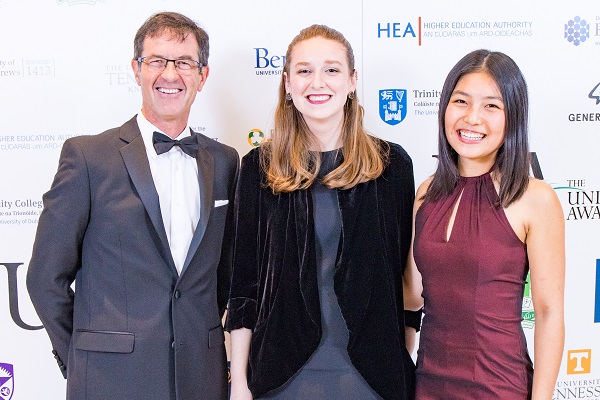An international spotlight on undergraduate research
January 26, 2018
Share

Undergraduate students across Queen’s who receive top marks on their research papers are now invited to submit them to the Undergraduate Awards 2018 program, a prestigious international competition.
The awards, presented each year at the Undergraduate Awards Global Summit in Dublin, Ireland, celebrate undergraduate research from students across all disciplines and around the world. Global winners from each category receive a medal at the ceremony, and the top 10 percent of applicants in each category receive the designation of highly commended entrant. Last year, the program received nearly 6,500 submissions from 299 institutions in 47 countries.
Students can submit up to three research papers, each A grade or equivalent. There are 25 categories, ranging from art history to engineering to life sciences. Each category has different criteria for submission, depending on the nature of the discipline.
Global and highly commended winners will be eligible to spend four days in Dublin for the Global Summit, providing opportunities to meet renowned researchers from around the world, present findings in “three minute thesis” presentations, and explore the historic city of Dublin. Global winner research papers will be published in the Undergraduate Journal to display the high level of undergraduate research being produced.
Eden Gelgoot (Artsi’17) was the global winner for the 2017 Art History and Theory category. Her essay focused on the role of the UNESCO World Heritage List in the commemoration of the Second World War, based on her final term paper for the course Conservation Principals: Cultural Heritage Preservation.
“I am very grateful for the recognition I received from the Undergraduate Awards,” says Ms. Gelgoot. “It has provided me with the opportunity to present research that I am passionate about to an international audience, to publish my work, to travel to Dublin, to learn about the work being done globally in diverse areas of research, and to build an international network of friends. I would highly recommend that undergraduate students at Queen’s consider submitting their work. The work has already been done and the submission process is simple, so why not take a chance at having your work recognized and winning an opportunity of a lifetime?”
Sari Ohsada (Artsci’19) was one of the highly commended entrants with her submission for the 2017 Social Sciences: Anthropology & Cultural Studies category. Her essay explored how to facilitate smoother adaption and resettlement for Syrian refugees who escaped a combination of drought in 2006 and civil war starting in 2011. She originally wrote the essay for the course Cross-cultural Research Methods.
“Being part of the Undergraduate Awards Global Summit 2017 in Dublin was one of the most enriching experiences of my life. Meeting 130 undergraduate students from across the world reminded me that there are numerous disciplines and different approaches to conducting well-thought research,” says Ms. Ohsada. “At the same time, I was also amazed by the interdisciplinary nature of our research topics, as they often linked with each other and related to more than one category.”
Other highly commended entrants from Queen’s last year included:
- Caela Fenton in the Literature category for her essay on oral tradition in Visions of an Inuk by Anthony Apakark Thrasher,
- Vinyas Harish in the Social Sciences: Sociology & Social Policy category for his essay on social issues with the implementation of telemedicine, and
- Evelyna Ekoko-Kay in the Literature category for her two essays, one on the concepts of diasporic identity, multicultural policy, and Indigenous erasure in What We All Long For by Dionne Brand and the other on gender and exile in old English elegies.
To learn more about the Undergraduate Awards and how to submit your undergraduate work, visit their website. Submissions close by June 12, 2018. Graduates of 2017 or students who will graduate in 2018 or 2019 are encouraged to apply.